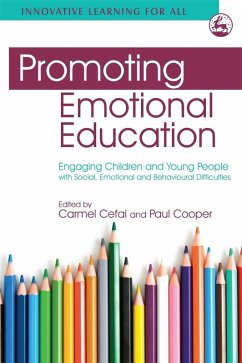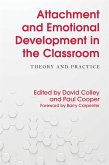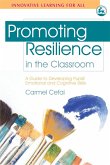Unlike IQ, emotional competence can be nurtured and developed, and is a key factor in physical and mental health, social competence, academic achievement and other aspects in the personal and social development of children and young people.
Promoting Emotional Education connects with the contemporary shift from an exclusively academic focus towards a more balanced and broader approach to education, with an emphasis on both academic and emotional literacy. The book suggests adopting educational practices which encourage feelings of emotional security, promote trusting and supportive relationships and reflect students' views and feelings; essential qualities for healthy personal and social development in children and young people. The contributors emphasise evidence-based practice, proposing various student-centred and emotion-focused approaches and strategies which have proven to be effective in improving the social and academic behaviour of children and young people with social, emotional and behavioural difficulties. These include student voice approaches, peer-mediated support strategies, personal and social education, nurture groups and aggression replacement training amongst others.
An illuminating read, this book will be of interest to school staff and professionals, psychologists, social workers, health workers, researchers and practitioners and anyone interested in developing innovative approaches to the promotion of emotional education among children and young people.
Promoting Emotional Education connects with the contemporary shift from an exclusively academic focus towards a more balanced and broader approach to education, with an emphasis on both academic and emotional literacy. The book suggests adopting educational practices which encourage feelings of emotional security, promote trusting and supportive relationships and reflect students' views and feelings; essential qualities for healthy personal and social development in children and young people. The contributors emphasise evidence-based practice, proposing various student-centred and emotion-focused approaches and strategies which have proven to be effective in improving the social and academic behaviour of children and young people with social, emotional and behavioural difficulties. These include student voice approaches, peer-mediated support strategies, personal and social education, nurture groups and aggression replacement training amongst others.
An illuminating read, this book will be of interest to school staff and professionals, psychologists, social workers, health workers, researchers and practitioners and anyone interested in developing innovative approaches to the promotion of emotional education among children and young people.
Dieser Download kann aus rechtlichen Gründen nur mit Rechnungsadresse in A, D ausgeliefert werden.









